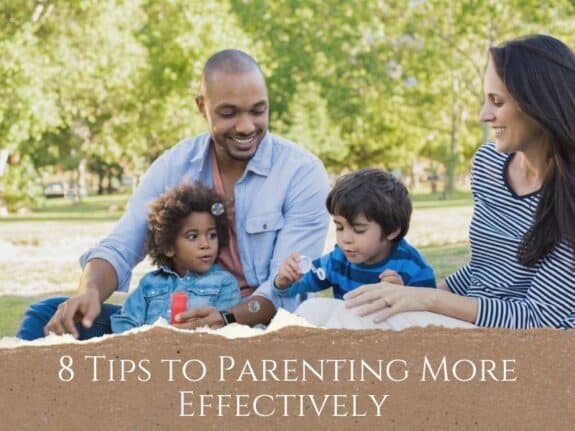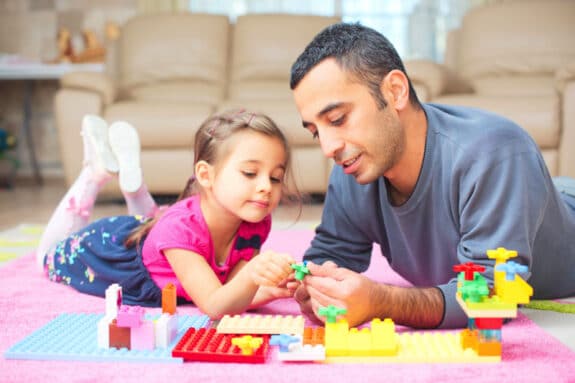We’ve all done it, one time or another….lost our temper with our

Catch Your Kids Doing Something Good
It’s easy to focus on the unsavory, messy, or unruly behavior of your child, but doing so can be rather counterintuitive.
By giving these behaviors more attention than they probably deserve, you might actually encourage more of the same. (Notice I said probably – some negative behaviors do need to be addressed.) That’s because kids who receive who more negative attention than positive, often have an internal sense of “wrongness.” As a result, they’re even more likely to act out.
Try focusing on the positive behaviors of your children. Catch them doing good things, and verbally address them. It doesn’t have to be anything big or major.
Perhaps they shared a toy, even though they didn’t want to. In this instance, you would verbalize how difficult it must have been for them, and then praise them for sharing anyway.
By approaching parenting in this manner, you’re satisfying your child’s innate desire for approval and praise. You’re also telling them kind of behavior you want to see out of them, rather than the behavior that you don’t. You’re shifting the focus away from negative behavior and onto the positive – and we could all do with a bit more positive in the world.
Whisper When You Want to Yell
I used to be a yeller. Like, really bad. Really, really bad.
But it seemed like, the more I yelled, the less my kids listened.
My parenting guardian angel (I’m lucky to have had one of these) suggested I try something a little bit strange. “Try whispering when you want to yell,” she said.
It sounded silly and insane, but I tried it anyway.
Whenever I wanted to yell, and when I had to say something that would normally result in my yelling (pick up your toys, please), I’d lower my voice to an almost whisper instead.
It took a few tries, but I noticed my kids were starting to listen more intently. I wasn’t repeating myself as much, and I was far less stressed. The urge to yell slowly dissipated, and now I hardly ever raise my voice (unless I’m insanely excited).
Try Using Boundaries Instead of Consequences
There is a distinct difference between consequences and boundaries. Consequences are parent-applied. Boundaries are inherent to safety and a healthy social structure.
A consequence is, “I’m taking your tablet if you don’t clean your room.”
A boundary is, “I’m sorry, but we only get tablet time after our room is clean.”
Struggling to see the difference? I did, too, at first.
The boundary stands, every day of the week. It is an expectation that never changes.
Consequences are usually only delivered after a behavior has taken place. The child may not even know that a consequence will occur for a specific behavior, so we have to warn them. If they’re caught up in being kids, they may not listen. Then, to avoid looking wishy-washy to our kids, we then have to follow through with the consequence.
Boundaries remove this dynamic by ensuring that your kids know what you expect from them.
One more important note on boundaries: Be selective about where you place them. Really think about whether the behavior is simply unsavory, or if it is something that could cause legitimate harm.
Here’s an example:
We have a kiddo that makes strange noises all day long. With his mouth. His hands. Anything he touches. We suspect ADHD, but it could just be his age.
We don’t address it.
Who cares?
The noise doesn’t reach levels that it hurts anyone’s ears. He’s not harming anyone. He’s just…occupying himself. Sure, it might get annoying every now and again, but life can be annoying. If I need a break, I simply request that he spend some time outside. Or I take a time-out for myself. I go and read a book or spend some time out in the garden.
Now, this same child also struggles with swinging things around inside the house. Toys. Anything attached to a string. Someone could get hurt. Again, I employ boundaries.
“You know, I think you might have more fun with that outside. Plus, I bet it’s safer. What do you think?”
I’m not angry. I’m not yelling. I don’t even indicate that his behavior is “wrong.” I simply remind him that there are boundaries – You can’t do anything that will harm yourself or anyone else.
Making this one change has allowed me to spend less time correcting my kids, and more time enjoying them. And, interestingly enough, those mouth noises and strange behaviors have dissipated, naturally, and on their own. No stress or yelling necessary.
Say “Yes” More Than You Say “No”
This one was really difficult for me. I actually still struggle with it.
As parents, we’re used to saying no. Kids want everything they see on television. Everything their friends have. They ask for things at what may seem like the worst possible time. We get used to saying the word, “No,” to the point that it becomes our default.
But constantly saying “no” can have a pretty negative impact on your kids. It can really break their spirit, and it teaches them that you’re a blockade to the things they want. Mine would just start doing things without asking – especially if they didn’t see any harm in doing it.
Saying “yes” more often encourages them to come to me when they want to do something. It also communicates that I’m not the “bad guy.” There are just some things that can’t be done.
If I have do have to say no, I also give them a reason. It’s not because I’m a stick-in-the-mud (not that I worry about that) or a mean parent; it’s that we don’t have the means or ability to do it. Or it’s just not safe.
Spend More Time Playing
As a mom who now has one adult, two teens, and two almost tweens, I’m going to tell you a secret…I know you know this already. People tell you it all the time….but you don’t realize just how true it is until you’re there.
It goes so fast.
Before you know what hit you, your kids are driving, speeding more time with their friends. I know it feels like this constant care phase is going to last forever, but I promise you, it won’t.
So stop.
Stop running. Stop spending all of your time worrying about the state of your house, the bills that keep piling up, and the never-ending pile of laundry.
Take five minutes. Ten minutes. An hour.
Play with your kids. Read to them. Paint. Color. Play with ladybugs and fireflies. Make hot chocolate. Build dirt castles and create sidewalk art.
Do those things that you want to do with them. Stop worrying about the work. It’ll be there later. Your kids won’t be, so enjoy this time. It goes so fast.
Kids also learn through play, so by stopping to engage in it, you’re teaching them some important life lessons (like all work and no play makes for a lot of stress). You’re also developing a healthy bond that carries over into other aspects of parenting (like discipline).
Give Your Child More Choices
No one likes being told what to do. So why do we do it to kids?
A lot of times, it’s because we see things through the eyes of an adult. We know it’s not good to eat ice cream for breakfast (but maybe we should every now and again). We can’t reasonably pay our bills and afford that $400 toy they want and think they need. We know that car seats are the safest place for children. So we take away our kids’ choices because we “know better.”
But that doesn’t mean our kids don’t deserve a healthy dose of control.
You’ll be amazed at what happens when you give it to them. When kids have more control and power over their own being, they’re far more likely to comply when you have to give a hard no. And you’ll notice fewer power struggles (because that’s what you’re creating by taking away your kids’ choices).
I recommend starting small. Rather than waste your time on fighting with your kids over dinner, let them pick between leftovers or the meal you’ve prepared. Notice meal refusal is not one of the choices. If they don’t make a choice after a reasonable amount of time, make it for them.
Before you know it, you’ll have master decision makers! And isn’t that what we’re really hoping to raise? Kids that can make good, healthy choices?
Invite Your Kids to Come Up with Solutions to Mistakes and Poor Choices.
Kids are going to make mistakes. They’re human, just like you.
They’re not bad. They’re not trying to annoy you. Most of the time, they don’t even mean to mess up. They just have a harder time controlling their impulses.
Yet, unlike adults, kids have someone imposing consequence on their every mistake. That can get pretty frustrating for kids (just imagine if someone did it to you). It can also lead to some pretty intense power struggles. (Trust me on this one!)
We avoid the power struggle altogether by inviting our kids to be a part of the solution. I ask them about their choice – not why they made it, but why it was a poor one. (I know why they did it…they’re not perfect. Neither am I.) Then I ask them how they’d like to resolve it.
You’d be amazed at what they’ve come up with, all on their own. Apology letters. Helping siblings with chores because they said or did something hurtful. I’ve even had kiddos suggest their own grounding because they knew they overstepped an important boundary.
We don’t impose consequences in my house; the kids do. And they’re far happier for it. We’ve also noticed another strange phenomenon – our kids make fewer poor choices.
March to the Beat of Your Own Drum
If there’s anything I’ve learned thus far in parenting, it’s that we all do it differently.
I don’t impose my views on anyone else. If someone asks, I’m glad to share what we do and why we do it. But otherwise, I just focus on my own little tribe.
I don’t worry about how I look to other parents. I know the truth.
I know my kids are happy. They’re smart and well rounded. And they know the difference between right and wrong. More than that, I know I can trust my kids to make good choices because I’ve taught them that I’m not the bad guy here. I just want the to make decisions that are thoughtful. Because it’s decisions that shape our lives.
Life is full of consequences – both natural and unnatural. There are laws and rules that we all have to follow. But everything else is relevant. And by marching to the beat of my own parenting drum, by not comparing myself to other moms and the way they do things, I teach my kids that there’s nothing wrong with being your unique self. There are just some things that we can’t do.
I’m not a parenting expert. Some days, I’m actually quite horrible at it. But these tips have shaped my family for the better. I hope they help with yours.







